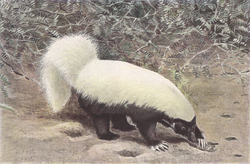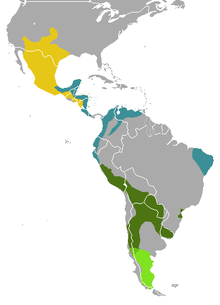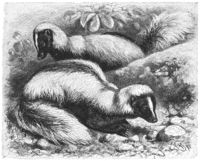- Hog-nosed skunk
-
Hog-nosed skunk 
Scientific classification Kingdom: Animalia Phylum: Chordata Class: Mammalia Order: Carnivora Family: Mephitidae Genus: Conepatus Species - C. chinga
- C. humboldtii
- C. leuconotus
- C. semistriatus

Conepatus ranges The hog-nosed skunks belong to the genus Conepatus and are members of the family Mephitidae (skunks). They are native to the Americas.
Contents
Species
- Conepatus chinga - Molina's hog-nosed skunk
- Conepatus humboldtii - Humboldt's hog-nosed skunk
- Conepatus leuconotus - American hog-nosed skunk
- Conepatus semistriatus - Striped hog-nosed skunk
Recent work has concluded that the western hog-nosed skunk or common hog-nosed skunk (formerly Conepatus mesoleucus) is the same species as the American hog-nosed skunk, and that Conepatus leuconotus is the correct name of the merged populations.[1][2]
Description
The individual hog-nosed skunk species vary in size, but among them is included the largest of all skunks. All are characterized by comparatively short hair, especially on the tail, and this appendage lacks the plumelike appearance observed in other skunks. The nose is prolonged into a distinct "snout", naked on the top and sides and evidently used for rooting in the earth after the manner of a pig. In addition, the front feet are armed with long, heavy claws, and the front legs and shoulders are provided with a strong muscular development for digging, as in a badger. This likeness has led to the use in some places of the appropriate name "badger skunk" for these animals. The single white stripe along the back, and including the tail, is a common pattern with these skunks, but this marking is considerably varied, as in the common species.
The hair on these skunks is coarse and harsh, lacking the qualities which render the coats of their northern relatives so valuable.
Range
Habitat
Where their range coincides with that of the common skunks, the local distribution of the two is practically the same. They live along the bottom-lands of watercourses, where vegetation is abundant and the supply of food most plentiful, or in canyons and on rocky mountain slopes.
For their protection hog-nosed skunks create their own burrows, generally within a bank, or beneath a rock, or the roots of a tree, but do not hesitate to take possession of the deserted burrows of other animals, or of natural cavities among the rocks. Owing to their strictly nocturnal habits, they are generally much less frequently seen than the common skunks, even in localities where they are numerous.
Feeding habits
Although both the spotted skunk and common skunks live mainly on insects, the hog-nosed skunks are even more insectivorous in their feeding habits. The bare snout appears to be used constantly for the purpose of rooting out beetles, grubs, and larvae of various kinds from the ground.
References
- ^ Western Hog-nosed Skunk
- ^ Cuarón AD & Helgen H (2008). Conepatus leuconotus. In: IUCN 2008. IUCN Red List of Threatened Species. Downloaded on 2008-10-24.
This article incorporates text from the publication Wild Animals of North America, copyright 1918 by the National Geographic Society. This book is in the public domain.
Categories:- Skunks
Wikimedia Foundation. 2010.

